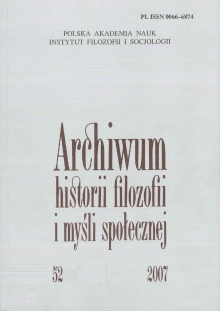Teologiczne implikacje teorii przedmiotu w filozoficz¬nym przełomie średniowiecza i nowożytności
Theologic Implications of Descartes’ Theory of Object in the Philosophical Turn of The Middle Ages and Modernity
Author(s): Wojciech StarzyńskiSubject(s): Philosophy, Middle Ages, Theology and Religion
Published by: Instytut Filozofii i Socjologii Polskiej Akademii Nauk
Keywords: przedmiot; Augustyn; Duns Szkot; Henryk z Gandawy; Tomasz; Kartezjusz; teologia;
Summary/Abstract: The article begins with a comparison of Descartes’ theory of object with its scholastic predecessors. In Descartes’ thought the object is restricted to its human figure, while Augustine, Henry of Ghent and Duns Scotus describe this concept primarily in the horizon of the divine thought. Even if Descartes leaves out the theological meaning of object, its new epistemic subject becomes the ground of the new relation named absolute whose certain features resemble the theological one. However the danger of the ontic univocity which thus appears, is eliminated by Cartesian theory of the eternal truths formulated in 1630 in letters to Mersenne.
Journal: Archiwum Historii Filozofii i Myśli Społecznej
- Issue Year: 52/2007
- Issue No: 52
- Page Range: 59-75
- Page Count: 17
- Language: Polish

